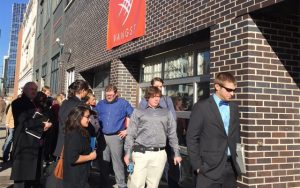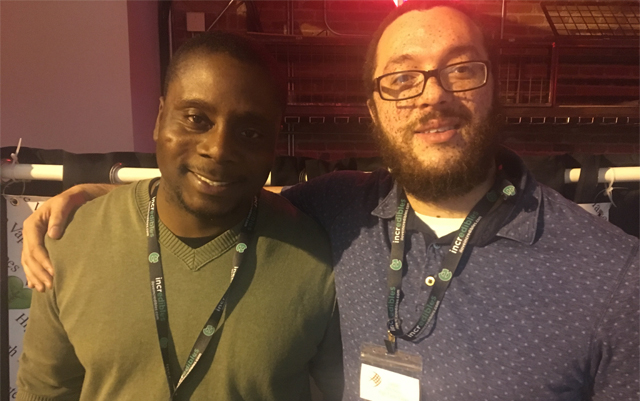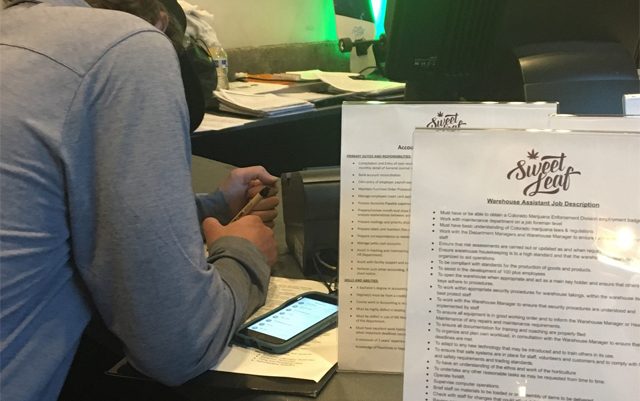Cannabis companies are calling for more skilled workers to meet the demands of flourishing businesses in a growing industry. Basically, the job market in cannabis is more than just budtenders and growers.
At this point in the game, the cannabis industry is preparing itself for a future of financial growth with more corporate employment opportunities. It’s not just about handling the plant anymore; positions for sales, IT, and even c-level positions are open and ready for resumes.
One entrepreneur who’s made a business of finding those perfect matches for employee and company is Karson Humiston. At age of 23, she’s doing something right as she’s in charge of one of the largest cannabis placement companies, Vangst Talent.
In the past year, Humiston said she went from mostly placing budtenders and other entry level dispensary positions to corporate, more skilled workers.
It’s a sign of the changing trends in the cannabis job sector – but are non-cannabis industry employees ready to make the jump?
The short answer is: perhaps, with some encouragement.
“At Vangst, we strive to give people coming from other industries the tools to make an informed decision on whether a new career in cannabis is right for them.” She continued, “A candidate coming from retail or the restaurant sectors could be skeptical or unaware of the potential in the green industry right now.”
That’s why she’s keen on sharing third-party, trusted industry analysis to viable candidates. It helps prove that cannabis has the potential to become a multi-billion-dollar industry.
Standing Stereotypes
Overcoming the ‘stoner’ stereotype is something the Vangst team focuses on daily.
When they reach out to qualified candidates for an open position on LinkedIn, the most common question they get in return is: Am I going to go to jail?
A whopping 35 percent of people that are candidates aren’t applying, according to Humiston. That’s a massive pool of employees that aren’t reaching for their maximum potential as a job seeker.
“In order to combat the hesitancy to work in the legal sector we invite them to learn, and apply.” She said, “it’s what we accomplished with our latest Vangst Career Fair in Denver this month.”
Denver’s Biggest Career Fair
Last week, Denver held its third Vangst Career Fair. For the third time in two years, more than one-thousand cannabis job seekers lined the sidewalk waiting for the door to open and get the chance to get some one-on-one time with the biggest names in the business.
Native Roots is a large-scale cannabis company that’s seen real growth over the past few years. They began with only about a hundred employees, now they are up to seven-hundred – and looking for a few more at the career fair.

One representative for the company said they are looking for marketing, IT, and sales positions for two new stores they are opening.
“There’s lots of people outside the industry looking to get into the industry because it’s seeing a lot of success, it’s like the rush to the alcohol industry after prohibition,” the representative said at the career fair.
“I’m seeing lots of interest from people who smoke, and don’t,” added the Native Roots representative.
Humiston was pleased with the turnout. She was told by her vendors that they took hundreds of resumes, and are already making piles for those who they want to call back for the job.
“I heard from the job seekers that they feel like they got the job, some even have interview times locked in for next week, and it’s great to see these matches being made,” she said.
Pro Tips
According to Humiston, her tip to hiring companies is to stay organized.
“Finding the applicant you loved in-person is tough if you don’t have notes or a spreadsheet to keep track of them all,” advised Humiston.
She recommends companies make a spreadsheet with notes of the applicants they liked. She said she likes to jot down notes on the person right on their resume so it’s not like trying to find one in a thousand later on.
Don’t forget the punctual follow-up.
This goes for job seekers AND hiring managers.
Companies need to reach out and schedule second interviews quickly, said Humiston. “Don’t dilly dally over the weekend, because your favorite candidates could get snatched by one of the other forty companies at the career fair.”
It also behooves the candidate to send an email after the initial meeting. “Follow up, follow up, follow up,” said Humiston. “Remember, the vendors spoke to hundreds of people, and if applicants send them an email to meet again, it helps them stand out.”
April Emma is an event specialist for Leafly. Although Leafly wasn’t hiring in Denver, they came out to talk to professionals weary about weed. “It’s all about being able to differentiate yourself in the industry – education, and knowing what you are talking about is a must for this industry,” she said.
It’s also about hiring quality over quantity. For Emma, a quality candidate embodies the brand – but consumption of cannabis isn’t a must. At the career fair, she was pleased with about a handful of really qualified people. Alas, Leafly is only hiring for corporate positions in Seattle at the moment.
From reading the room at the cannabis career fair, it was clear that most job seekers have more respect for the industry now that most states have some form of cannabis legislation. Although, there were reports of some people who dressed too casually for the event, and even some that came in visibly high.
East Coast Ganjapreneurs Take Center Stage

Cashmere Gore and his brother drove all the way from Pittsburgh to make the career fair. It took them twenty-four hours, and they got in at two in the morning. It didn’t faze these East Coast entrepreneurs, because they’ve been waiting for an opportunity to talk to cannabis industry professionals about their medical-based cannabis startup, called High Taste.
“For me, it’s not just about selling vapes, I’m working toward establishing a non-profit organization to support education in STEM for young people back home,” explained Gore from the merchandise product section of the career fair.
He’s selling disposable vape pens now, but his goal is to make enough revenue to have his non-profit pay older males to teach free coding classes to kids after school.
“I’ve seen a severe lack of male support in kids’ lives,” he said. Gore has worked in the Pittsburgh public school system with special needs students. His cause is the foundation for his business and he came all the way to Denver for the connections.
Fortunately, he said he met many dispensary owners, and four of them already requested wholesale purchases. It’s great news, and a start to his proof of concept as he’s all in on his social entrepreneurial start-up, after leaving his non-cannabis sales job this summer.
“This was a test for my business idea,” Gore said. “The result, it’s a complex assurance I’m on the right path.”







Great piece. Keep up the good work and looking forward to continued insight as this movement continues.